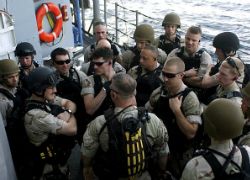In my previous post, I argued that the two pirate negotiators prosecuted by the United States – Mohammad Saaili Shibin and Ali Mohamed Ali – must have incited or intentionally facilitated piracy while on the high seas in order to have exposed themselves to prosecution by a court whose only basis for taking the case is universal jurisdiction.
There is another way for a pirate negotiator to subject himself to universal jurisdiction: an ex ante agreement to negotiate for pirates in the event of a successful hijacking.

(Maritime Security Review)
This avenue is not applicable in the Shibin or Ali cases, as there is no evidence suggesting such an agreement, but it is nonetheless worth exploring because this is the avenue through which the true kingpins can be brought to justice.
The source of this second avenue of universal jurisdiction is the plain meaning of the verbs “to incite” and “to facilitate” contained in UNCLOS art. 101(c).
In the English dictionaries of the 18th, 19th, and 21st centuries, to incite is “to stir up,” “to animate,” and “to move to action.” To facilitate is to “to make easy,” “to free from difficulty,” or “to help bring about.”
Both of these verbs have prospective implications. An inciter or facilitator must either induce violence, detention or deprivation on the high seas or make such violence, detention, or deprivation on the high seas easier than that it would have been without the inciter or facilitator.
It strains both logic and credulity to suggest that an individual who had no involvement in – or even knowledge of – a hijacking on the high seas somehow spurred on or made easier that particular hijacking.
So in the end, we are left with two potential avenues for a pirate negotiator to subject himself to universal jurisdiction. The first is to commit an act of inciting or facilitating while physically present on the high seas, and the second is to enter into an ex ante agreement with the pirates.
The second avenue brings the real kingpins – financiers and investors, not negotiators – within the scope of universal jurisdiction. As for negotiators who neither enter into an ex ante agreements nor set foot on the high seas, they should still be judiciously targeted for prosecution, but something more than universal jurisdiction is required.
Flag states of the victim ship, national states of the crewmembers, as well as Somalia itself must step in and fulfill their international obligation to prosecute.
Jon Bellish is a Project Officer at the Oceans Beyond Piracy project in Boulder, Colorado (though all of his views are his own), and he has experience in United States piracy trials. He just got on Twitter. Cross-posted on Communis Hostis Omnium.


